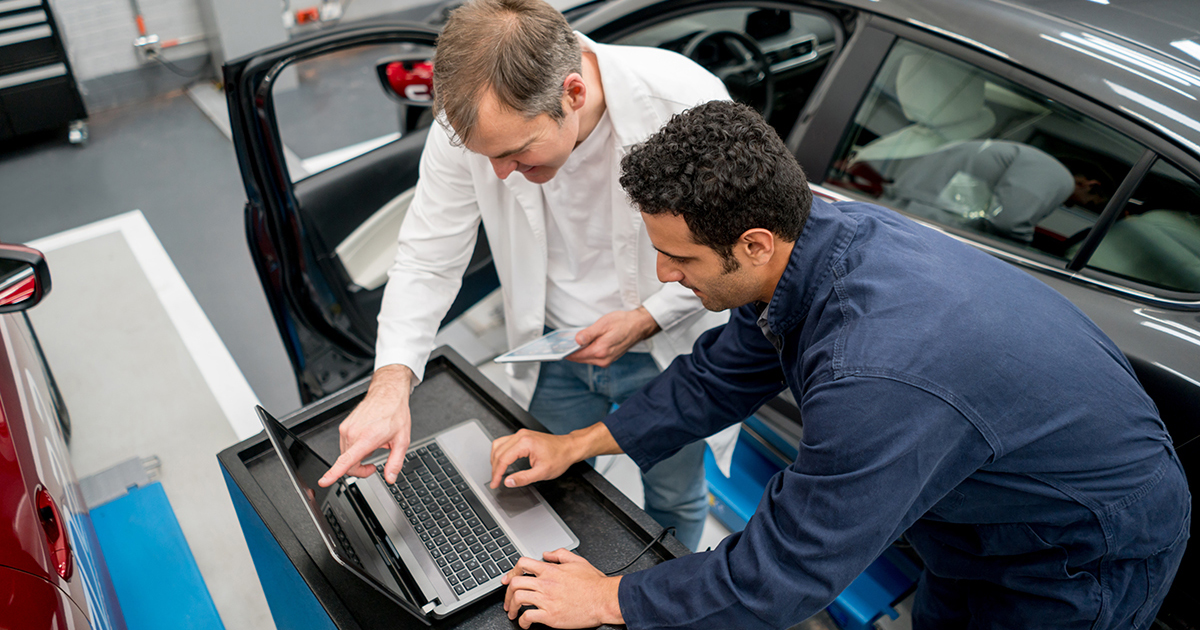Engaged Students, Smarter Technicians: How Artificial Intelligence is Reshaping Automotive Education

As the automotive education world grapples with increasing influence of Artificial Intelligence (AI), teachers and students must adapt. Learning to work with AI, instead of against it, will allow automotive instructors to expand their teaching abilities.
AI is like a personalized teacher that can adapt the material to make highly complex topics make sense in a variety of ways for each student making it. As automotive technology systems integrate more AI into operation it will change the way people interact with their vehicle and how technicians repair the failures that are sure to come with this technological disruption. Read on to learn more about how teaching automotive will change as AI advances.
The Role of Artificial Intelligence in Automotive Classrooms
At the core of AI-driven education is adaptive learning systems that caters to an individual students’ needs and learning style. These types of systems analyze vast amounts of data, which allows a personalized learning experience to connect with the student on a level they are comfortable with.
AI-powered learning platforms, with their ability to adapt to the pace and style of individual learners, are revolutionizing how knowledge is disseminated. Automotive classrooms are now including interactive simulations powered by machine learning that allows the student to engage in virtual reality environments along with augmented reality that mirror real-world automotive scenarios.
The more immersive the experience, the higher the possibility of making learning permanent and engaging. When students are engaged with learning, they can retain more of the information that is presented in their learning path.
In the world of automotive education, AI is used in a multitude of forms. Intelligent tutoring systems provide real-time feedback ensuring that students receive immediate support when tackling challenging concepts. AI driven curriculum development tools ensure that the learning materials are always up-to-date and relevant, aligning with the rapid advancements in the automotive industry. Students get hands-on experience with cutting-edge technologies, that prepare them for the future challenges within the automotive sector. The ability to mesh the capability of AI in the repair of advanced automotive applications increases the ability of the technician to effectively diagnose integrated applications and puts them on firm footing to develop into the technician of tomorrow.
Customized Learning Based on Student Feedback
The benefits of AI in education lies in its ability to tailor learning experiences. With AI-based student assessments, educators can identify areas where individual students need improvement. Adaptive learning platforms then provide targeted supporting materials to help fill in any areas where the student is faltering, and it helps to build skill development.
In the automotive technician domain, this translates into students honing their skills through interactive projects, simulations and focused curriculum. Algorithms which analyze students' performance allow educators to provide additional support beyond the base curriculum, to meet students where they are. This personalized approach ensures that each student master’s the required skills, creating a cohort of highly technically competent automotive technicians.
Enhanced Student Engagement
AI not only personalizes learning but also enhances student engagement and collaboration. Collaborative Learning with AI tools encourages teamwork, allowing students to collaborate on projects effortlessly. Additionally, educational chatbots facilitate instant feedback to help with communication, ensuring that students can seek help whenever they encounter challenges.
Gamification, powered by AI algorithms turns learning into an interactive and competitive experience. Students compete in challenges and quizzes, reinforcing their knowledge in an engaging manner. While AI has revolutionized automotive education, challenges remain. Accessibility to AI tools, providing adequate training for educators, and addressing ethical considerations are all ongoing concerns no matter what the demographic. Despite these challenges, the future of AI in education looks hopeful. Emerging trends like Predictive Learning Analytics and Innovative Learning Technologies are poised to shape the future of AI-driven education. Predictive analytics will anticipate students' needs, offering proactive support, while innovative technologies will continue to expand the horizons of interactive learning experiences.
It’s evident that AI is a powerful medium in shaping the education landscape. In automotive education, AI has transformed classrooms into dynamic, interactive hubs of learning. AI is lacking, however, in most automotive programs as they are more general in nature. There are some AI courses that are available in programs but are electives which do not always connect the topics to automotive education. As AI usage rapidly explodes in use within the automotive sector it requires the education system to keep up with the changing environment. Including a basic AI course within automotive training curricula will expose students to the next evolution of automotive technology allowing them to start experimenting with the use of AI in automotive repair. Building personalized learning pathways, honing skills, and enhancing collaboration, AI ensures that the technicians of tomorrow are not just educated, but also prepared to innovate and lead in the automotive industry.
Related Content:
- Near Field Communication is Disrupting the Auto Industry. Here’s How Automotive Instructors Should Adjust Their Teaching
- Wireless EV Charging: Transforming the Future of Electric Vehicles
- The Hydrogen Fuel Cell Mass Adoption Myth: Should We Teach Hydrogen Fuel Cell Technology to Automotive Students?
About the Author:
Nicholas Goodnight, PhD is an ASE Master Certified Automotive and Truck Technician and an Instructor at Ivy Tech Community College. With nearly 20 years of industry experience, he brings his passion and expertise to teaching college students the workplace skills they need on the job. For the last several years, Dr. Goodnight has taught in his local community of Fort Wayne and enjoys helping others succeed in their desire to become automotive technicians.